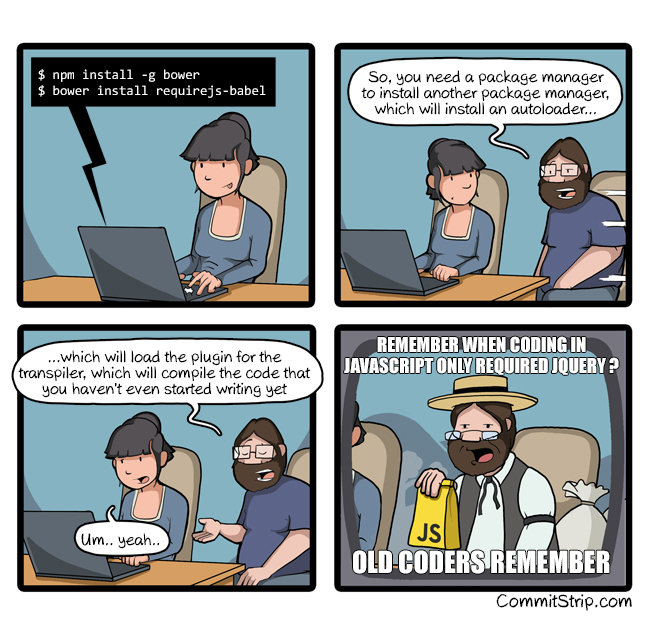Guix and Nix: Functional package management
Guix and Nix
Functional package management
What's in it for me?
Meta
Claes Wallin ( lambda at clacke.greatsinodevelopment.com)
2017-01-24 HK Functional Programming
© 2016–2017 Claes Wallin
CC-by-SA 4.0 except where noted.
Stow
Stow

Version 1.3.2 perfected in 1996
Simplest possible package manager
(...yet does things dpkg/rpm can't!)
$ ./configure --prefix=~/.local
$ make
$ make install prefix=~/.local/stow/min_app-2.3.1
$ cd ~/.local/stow
$ ln -s min_app-2.3.1 min_app
$ stow min_appSymlink tree
.local/
├── bin
│ ├── din_app -> ../stow/din_app/bin/din_app
│ └── min_app -> ../stow/min_app/bin/min_app
├── lib -> stow/ett_lib/lib
├── share -> stow/min_app/share
└── stow
├── din_app -> din_app-5.7.3
├── din_app-5.7.3
│ └── bin
│ └── din_app
├── ett_lib -> ett_lib-4.3.2
├── ett_lib-4.3.2
│ └── lib
│ ├── libett_lib.so.4 -> libett_lib.so.4.3.2
│ └── libett_lib.so.4.3.2
├── min_app -> min_app-2.3.1
└── min_app-2.3.1
├── bin
│ └── min_app
└── share
└── man
└── man1
└── min_app.1Now what?
- Upgrades
$ rm min_app && ln -s min_app_9.3.4 min_app && stow -R min_app - Dependencies
- Manual
- Upgrades of dependencies
- Are you kidding me?!
- Atomic install of package and dependencies
- I did say "simplest possible!"
The Merkle
A hash tree
- Looser and stricter definitions. Loose definition here.
- Nodes have hashes. Parent hashes involve child hashes, validating the whole chain.
- Doesn't even have to be a tree, a DAG is good enough.
- BitTorrent, ZFS, git, BitCoin, IPFS, MaidSafe, Nix, Guix
Immutability
- The hash is the ID of the data.
- Immutable data, mutable references.
- Git refs, IPFS ipns, Nix/Guix profiles
- Live distributed systems seem to inevitably involve a DHT.
- Hashed, immutable data is a cache, if derivative / buildable.
- Garbage collection
The hash DAG of Guix / Nix
- Files and directories in
/gnu/store,/nix/store /gnu/store/zby49a...-hello-2.10/bin/hello- Immutable data: store
- Mutable reference: profile symlink
$ guix environment --ad-hoc hello -- which hello
/gnu/store/fc71rxim411dn41gcnnrhlvv4zy1qjah-profile/bin/hello
$ guix environment --ad-hoc hello -- bash -c 'readlink -m $(which hello)'
/gnu/store/zby49aqfbd9w9br4l52mvb3y6f9vfv22-hello-2.10/bin/helloThe hash DAG of Guix / Nix
$ ls -l ~/.guix-profile /var/guix/profiles/per-user/clacke/
lrwxrwxrwx 1 clacke clacke 47 Mar 27 05:40 /home/clacke/.guix-profile -> /var/guix/profiles/per-user/clacke/guix-profile
/var/guix/profiles/per-user/clacke/:
total 0
lrwxrwxrwx 1 clacke clacke 55 Jul 14 15:26 guix-profile -> /var/guix/profiles/per-user/clacke/guix-profile-30-link
lrwxrwxrwx 1 clacke clacke 51 Jun 24 17:21 guix-profile-28-link -> /gnu/store/f9i1pmzpk9s1m7bpgjrprh7mw88jcbcr-profile
lrwxrwxrwx 1 clacke clacke 51 Jul 14 15:22 guix-profile-29-link -> /gnu/store/6rlcrh78ljy6j4hbji4lqxnpfbd23835-profile
lrwxrwxrwx 1 clacke clacke 51 Jul 14 15:26 guix-profile-30-link -> /gnu/store/abdfzdkvvv1fsjr44rxxikw8yzsyiyvp-profileHash all the things!
$ ls -U /gnu/store/.links/ | head -n 5 | xargs file
12m47ggncih2sxfcjyajaad7j04bg8vr4jbch8rv7s5qmw13rmia: UTF-8 Unicode text
1pfixdyxlv2qvd8lzpp23lfbqqf0l7zwhjbfwaca1xsqq1i8pgis: Compiled terminfo entry
1mbcry0fi6sg8nz9yb8dbksh3lwyvc1jkg8f3nljm63crh9p11w3: ASCII text, with very long lines, with no line terminators
1rn7ra2pnc0qigy30ykk51m4i17jl52ijzvc5k4kqwjaipgyfp8k: Guile Object, little endian, 64bit, bytecode v2.0
0c0370icr2byr50zvxf9nqd2qikphxyyg08kp93kjq1ksxwpbdmz: Perl POD document, ASCII textFunctional package management
Functional programming
- No side-effects
- Data in, data out
- Same calculation twice, same data out
- Immutable data
- Mutable references (at some point!)
How does this translate to package management?
- No network, no irrelevant data
- Source, dependencies, tools in, package out
- chroot with only these things available
- Eliminate variables like hostname, time
- Package build functional -> reproducible -> cacheable, hashable
- System state = set of packages / services = top of hash DAG
What does this enable?
- Unprivileged builds
- Per-user package sets
- Per-process package sets
- Atomic install / config / rollback
- Mixed dependency versions
- ... which allows hard-coded dependency paths
Nix
Nix

Nix is the package manager
NixOS is the OS
Quick history
- 2003: First release
- 2004: NixPkgs on Darwin/OSX (!)
- 2013: NixOps
A typical package
{ stdenv, fetchurl }:
stdenv.mkDerivation rec {
name = "hello-2.10";
src = fetchurl {
url = "mirror://gnu/hello/${name}.tar.gz";
sha256 = "0ssi1wpaf7plaswqqjwigppsg5fyh99vdlb9kzl7c9lng89ndq1i";
};
doCheck = false;
meta = {
description = "A program that produces a familiar, friendly greeting";
longDescription = ''
GNU Hello is a program that prints "Hello, world!" when you run it.
It is fully customizable.
'';
homepage = http://www.gnu.org/software/hello/manual/;
license = stdenv.lib.licenses.gpl3Plus;
maintainers = [ stdenv.lib.maintainers.eelco ];
platforms = stdenv.lib.platforms.all;
};
}Imperative
$ hello
-bash: hello: command not found
$ nix-env -i hello
installing ‘hello-2.10’
these paths will be fetched (0.02 MiB download, 0.07 MiB unpacked):
/nix/store/20fyp0s5l59ixq7a8y02r9f5837plsiw-hello-2.10
fetching path ‘/nix/store/20fyp0s5l59ixq7a8y02r9f5837plsiw-hello-2.10’...
*** Downloading ‘http://cache.nixos.org/nar/0b8p13mywvl0d151xmil13fggl4kgjmjz8lz7yv0yjrw3pl0bm4r.nar.xz’ to ‘/nix/store/20fyp0s5l59ixq7a8y02r9f5837plsiw-hello-2.10’...
% Total % Received % Xferd Average Speed Time Time Time Current
Dload Upload Total Spent Left Speed
100 24052 100 24052 0 0 6280 0 0:00:03 0:00:03 --:--:-- 9439
building path(s) ‘/nix/store/rzpafr39rnia76a8lgc72is7r5svr5jm-user-environment’
created 3108 symlinks in user environment
$ hello
Hello, world!
$ which hello
/Users/cw/.nix-profile/bin/helloAd-hoc
$ hello
-bash: hello: command not found
$ nix-shell -p hello
[nix-shell]$ hello
Hello, world!
[nix-shell]$ which hello
/nix/store/20fyp0s5l59ixq7a8y02r9f5837plsiw-hello-2.10/bin/hello
[nix-shell]$ exit
$ hello
-bash: hello: command not foundManifest
$ hello
-bash: hello: command not found
$ cat default.nix
{ }:
let
pkgs = import <nixpkgs> {};
in pkgs.stdenv.mkDerivation rec {
name = "dummy";
src = ./.;
buildInputs = with pkgs; [
hello
];
}
$ nix-shell
[nix-shell]$ hello
Hello, world!
[nix-shell]$ which hello
/nix/store/20fyp0s5l59ixq7a8y02r9f5837plsiw-hello-2.10/bin/helloProfile
$ nix-env -p profile -i hello
installing ‘hello-2.10’
building path(s) ‘/nix/store/1in3spnpk55b7gisds2klp92rz5bzvhl-user-environment’
created 2 symlinks in user environment
$ ls -l
total 0
lrwxr-xr-x 1 cw staff 19 Jul 14 13:21 profile -> profile-1-link
lrwxr-xr-x 1 cw staff 76 Jul 14 13:21 profile-1-link -> /nix/store/1in3spnpk55b7gisds2klp92rz5bzvhl-user-environment
$ tree /nix/store/1in3spnpk55b7gisds2klp92rz5bzvhl-user-environment
/nix/store/1in3spnpk55b7gisds2klp92rz5bzvhl-user-environment
├── bin -> /nix/store/20fyp0s5l59ixq7a8y02r9f5837plsiw-hello-2.10/bin
├── manifest.nix -> /nix/store/akxg765a7fj3s9a4wjx1bfk02ya5fx8x-env-manifest.nix
└── share -> /nix/store/20fyp0s5l59ixq7a8y02r9f5837plsiw-hello-2.10/shareLanguage-specific dependencies
package.jsonrequirements.txtGemfile*.cabalpom.xml/build.gradle*.nuspec
Language-specific dependencies
*.nix:
- Get not only your Python/Ruby/JVM/CLR package, but also the system libraries required.
Language-specific dependencies
This is for a bash script and a python script:
{ }:
let
pkgs = import <nixpkgs> {};
in pkgs.stdenv.mkDerivation rec {
name = "build-env";
src = ./.;
buildInputs = with pkgs; [
wget
python
pythonPackages.lxml
git
gitAndTools.git-annex
];
}Guix
Guix


Guix is the package manager
GuixSD is the OS
Based on Nix
- Same daemon, but ...
- package and system definitions in scheme! (internal DSL)
- Less mature (announced 2012)
- Fewer packages (~3400 vs ~7500) (Debian ~49000!)
- More work on:
- Reproducibility
- Containers
- Systemd vs Shepherd
- Service dependencies
Differences from Nix language
- Not purely functional (but derivations are!)
- No definition-composition separation
- Scheme!
- "No syntax", macros
- Advanced bytecode compiler and VM (GNU Guile)
- No inline shell, derivations pure scheme
-
Even some tools reimplemented, e.g.
cpio - Calls to external shell/tools of course possible
-
Even some tools reimplemented, e.g.
A familiar package
(define-public hello
(package
(name "hello")
(version "2.10")
(source
(origin
(method url-fetch)
(uri (string-append "mirror://gnu/hello/hello-" version
".tar.gz"))
(sha256
(base32
"0ssi1wpaf7plaswqqjwigppsg5fyh99vdlb9kzl7c9lng89ndq1i"))))
(build-system gnu-build-system)
(synopsis "Hello, GNU world: An example GNU package")
(description
"GNU Hello prints the message \"Hello, world!\" and then exits.
It serves as an example of standard GNU coding practices. As such,
it supports command-line arguments, multiple languages, and so on.")
(home-page "http://www.gnu.org/software/hello/")
(license gpl3+)))Imperative
$ hello
-bash: hello: command not found
$ guix package -i hello
The following package will be installed:
hello 2.10 /gnu/store/zby49aqfbd9w9br4l52mvb3y6f9vfv22-hello-2.10
updating list of substitutes from 'https://mirror.hydra.gnu.org'... 100.0%g'... 66.7%
The following derivations will be built:
/gnu/store/44zv48y4fnrsx0prj1pxjw09h7rabzbg-profile.drv
/gnu/store/d18rgr2ngnw09sq9pbb9k40s3l6lx2d5-info-dir.drv
/gnu/store/4l7qyp4dng59zfwwhxk5j2ds2mmagdfj-ca-certificate-bundle.drv
7 packages in profile
$ hello
Hello, world!
$ which hello
/home/clacke/.guix-profile/bin/helloAd-hoc
$ hello
-bash: hello: command not found
$ guix environment --ad-hoc hello
updating list of substitutes from 'https://mirror.hydra.gnu.org'... 100.0%g'... 66.7%
The following derivations will be built:
/gnu/store/05jqsyrzgzdfgp12ww6ljm8q1yizj63c-profile.drv
/gnu/store/gy3942fm5sdgiij5y7s8mkymcfg2ghrx-info-dir.drv
/gnu/store/c1dnn48gw2w6c3xkk6qbma3jkavyw8dc-ca-certificate-bundle.drv
$ hello
Hello, world!
$ which hello
/gnu/store/3f7ilcf1cn0chk3jaicdbr4wpc4z3c63-profile/bin/hello
$ exit
exit
$ hello
-bash: hello: command not foundProfile
$ guix package -p profile -i hello
The following package will be installed:
hello 2.10 /gnu/store/zby49aqfbd9w9br4l52mvb3y6f9vfv22-hello-2.10
1 package in profile
The following environment variable definitions may be needed:
export PATH="profile/bin"
clacke@luk:~/tmp/guix$ ls -l
total 0
lrwxrwxrwx 1 clacke clacke 14 Jul 14 11:05 profile -> profile-1-link
lrwxrwxrwx 1 clacke clacke 51 Jul 14 11:05 profile-1-link -> /gnu/store/3f7ilcf1cn0chk3jaicdbr4wpc4z3c63-profile
$ tree /gnu/store/3f7ilcf1cn0chk3jaicdbr4wpc4z3c63-profile
/gnu/store/3f7ilcf1cn0chk3jaicdbr4wpc4z3c63-profile
├── bin -> /gnu/store/zby49aqfbd9w9br4l52mvb3y6f9vfv22-hello-2.10/bin
├── etc
│ └── profile
├── manifest
└── share
├── info
│ ├── dir -> /gnu/store/6w898pknyrndnaf9syrdak85kqv8v5bg-info-dir/share/info/dir
│ └── hello.info.gz -> /gnu/store/zby49aqfbd9w9br4l52mvb3y6f9vfv22-hello-2.10/share/info/hello.info.gz
├── locale -> /gnu/store/zby49aqfbd9w9br4l52mvb3y6f9vfv22-hello-2.10/share/locale
└── man -> /gnu/store/zby49aqfbd9w9br4l52mvb3y6f9vfv22-hello-2.10/share/manManifest
(define-module (_)
#:use-module ((gnu packages base) #:select (hello))
#:use-module ((guix packages) #:select (package origin))
#:use-module (guix build-system trivial)
(package
(inputs `(
("hello" ,hello)))
(build-system trivial-build-system)
(name "")
(version "")
(source (origin (uri #f) (method #f) (sha256 #f)))
(description #f)
(synopsis #f)
(home-page #f)
(license #f))Manifest
$ hello
-bash: hello: command not found
$ guix environment -l default.scm -- hello
Hello, world!
$ hello
-bash: hello: command not foundClosing words
Try it out!
- Put Nix on your OSX today!
- Put both on your GNU/Linux! (... and Stow!)
- NixOS works great in a VM, GuixSD getting there.
- Use Guix instead of Docker for the services on your VPS
- Try NixOps for your VMs! Nudge, nudge ... ;-)
- (... what's it like?)
- Use Guix to sneak tools into your minimal Docker instances
When you develop your next Python / Ruby / Guile / Node package
- Put a
default.scmand adefault.nixin there - Never use Bundler / VirtualEnv during development again
- Discover the horrors of Node packaging ;-)
Avoid packaging hell

(license: "any non-commercial purpose")
http://www.commitstrip.com/en/2016/05/10/a-moment-of-nostalgia/
Acknowledgements
Resources
- Nix and NixOS: https://nixos.org/
- Guix and GuixSD: https://www.gnu.org/software/guix/
- Guile Scheme: https://www.gnu.org/software/guile/
- Guix whitepaper: http://arxiv.org/pdf/1305.4584v1.pdf
- Let's Package jQuery: A Javascript Packaging Dystopian Novella
- hpr2198 :: How awesome is Guix and why will it take over the world
- Sander van der Burg's blog on buildEnv (But do read the whole blog. Everything. Especially the npm2nix stuff.)
Sources
- GNU logo: Original from https://www.gnu.org/graphics/heckert_gnu.html, modified by me. (CC-by-SA 2.0 | GFDL 1.3 | Free Art License)
- NixOS logo: Original from https://github.com/NixOS/nixos-artwork/tree/master/logo/, modified by me. (License: dunno handwave fair use)
- Guix logo: Original from https://www.gnu.org/software/guix/graphics/, modified by me. (GPLv3+ | GFDL 1.3 with exceptions, see source)
- GuixSD logo: Original from https://www.gnu.org/software/guix/graphics/, modified by me. (CC-by-SA 4.0 Intl)
Making of
$ cat default.nix
{ }:
let
pkgs = import <nixpkgs> {};
in pkgs.stdenv.mkDerivation rec {
name = "build-env";
src = ./.;
buildInputs = with pkgs; [
gnumake
pandoc
];
}
$ nix-shell --pure --run make